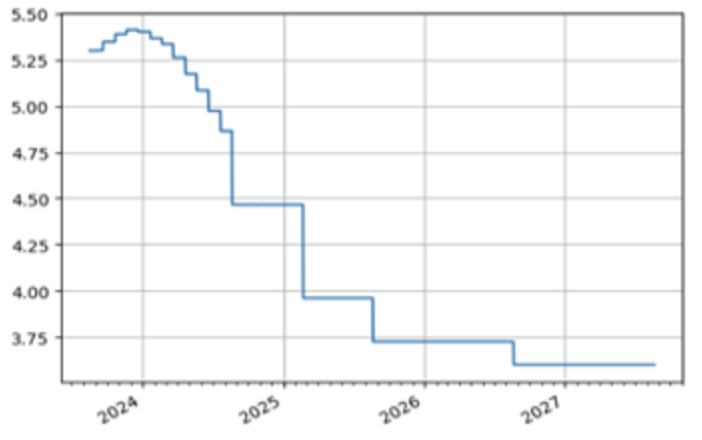







Rateslib is a state-of-the-art fixed income library designed for Python.
Its purpose is to provide advanced, flexible and efficient fixed income analysis
with a high level, well documented API.
Its design objective is to be able to create a self-consistent, arbitrage free framework for pricing all aspects of linear fixed income trading, such as spot FX, FX forwards, single currency securities and derivatives like fixed rate bonds and IRSs, and also multi-currency derivatives such as FX swaps and cross-currency swaps. Volatility products are under consideration for future versions.
The techniques and object interation within rateslib were inspired by the requirements of multi-disciplined fixed income teams working, both cooperatively and independently, within global investment banks.
Highlights#
Curve construction is simple but has huge flexibility#
Multiple interpolation modes are offered by default and the generalised process for curve solving means very specific pricing artefacts can be accurately modelled with the correct formulations. The framework is accessible and requires minimal configuration.
API is designed for users with full documentation#
Although any fixed income library uses complex mathematical processes, the API has been carefully designed to provide a workflow that is very intuitive. In the case of using it for small scale learning items often few parameters and arguments are required. For larger series of curves and more complicated object oriented associations the API signature does not materially change. Best practice is demonstrated in documentation examples.
xcs = XCS(
effective=dt(2022, 2, 14), termination="15M",
notional=100e6, float_spread=-10.25,
spec="eurusd_xcs", curves=[...],
) # Create a EUR/USD Cross-Ccy Swap
xcs.rate(solver=solver)
<Dual: -14.294203, [...], [...]>
xcs.npv(solver=solver, base="eur")
<Dual: -50,073.295467, [...], [...]>
Wide range of fixed income Instruments available#
The most recent version of rateslib contains the main Instruments that dominate linear fixed income products. The large array of input parameters for these gives scope to fully capture the nuances of these products across sectors and geographic regions, capturing aspects like trading calendars, day count conventions, payment delays, etc. New specifications and calendars are continually being added as users enquire.
A good example is a US Treasury Bond, replicated here with rateslib and the equivalent ticket in Bloomberg for reference point.
In [1]: ust = FixedRateBond(
...: effective=dt(2023, 8, 15), termination=dt(2033, 8, 15),
...: fixed_rate=3.875, spec="ust"
...: ) # Create a US-Treasury bond
...:
In [2]: ust.price(ytm=4.0, settlement=dt(2025, 2, 14))
Out[2]: 99.10641380057267
In [3]: ust.duration(ytm=4.0, settlement=dt(2025, 2, 14), metric="risk")
Out[3]: 7.11053190579773

Minimal dependencies to other Python libraries#
The dependencies are to NumPy, Pandas, and Matplotlib. Rateslib does not have any dependencies to any automatic differentiation libraries, such as PyAudi or JAX, preferring initially to use its own forward mode module.
The test coverage is very high.
Licence#
This library is released under a Creative Commons Attribution, Non-Commercial, No-Derivatives 4.0 International Licence. See here for more details.
Activities allowed:Academic work, personal learning, private and non-commercial uses, and non-profit functions.
Activities prohibited:Any commercial based activity, for example inside a bank, fund, or investment firm, or corporation.
Other licence options available:If you would like to discuss licensing, under very reasonable terms, please contact the author at rateslib@gmail.com.
Get Started#
Move on to the next page to Get Started
